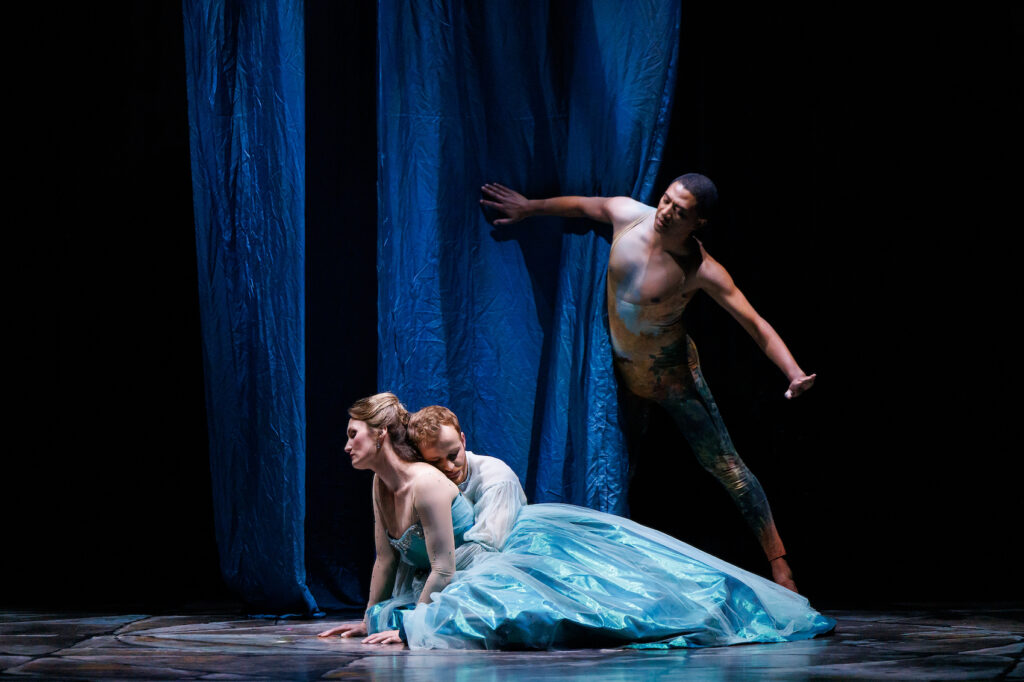It has been variously described, not in the least surprisingly given its tumbled evolution from idle aristocratic diversion to enduringly popular showpiece, as a pastorale, a pastoral masque, an English pastoral opera, a serenata, an oratorio or simply — and perhaps most fittingly of all — Mr Handel’s Musick.
Loosely adapted from Book XIII of Ovid’s Metamorphoses, Acis and Galatea, a deceptively lighthearted allegory of love, despair and transformation set beneath a darkening Arcadian sky, made its earliest appearance at Cannons in Middlesex, country seat of the Duke of Chandos northwest of London. Likely first performed as a semi-staged concert in the wealthy nobleman’s lavishly appointed gardens in 1718, the exclusive, highly colourful theatrical event would prove to be a compelling calling card for Handel, rising young composer, imported Saxon Kappelmeister to George I.
Acis and Galatea, a penultimate romantic idyll, underwent something of a circular journey from minimalist masque to compact two-act opera.
Handel’s furious diversion into the realm of hyper-amplified Italianate spectacle in 1732, propelled by a vastly expanded setting of a much earlier cantata, Aci, Galatea e Polifemo, had little, if any, impact on the ongoing development of George Frideric’s vastly more elegant English-language antecedent. A rival impresario who had poached his Cannons piece some months earlier driven from the Haymarket and ultimately out of business, Handel was free to indulge in over a decade’s worth of obsessive tinkering, expanding Acis and Galatea’s score, creating a second act, penning new arias, reviving the production over 100 times thereafter before his death in 1759. It were as if the poignant fairytale-like saga spoke to him on a fundamentally intimate human level — adoring shepherd, grieving water nymph, boastful monster all portrayed with the greatest of care, all profoundly resonant.
Peering beneath the surface of a rapturous masterwork, Opera Atelier casts a brilliant spotlight on Handel’s irresistible ode to ungoverned love, a fine, shining tribute to arguably the greatest musical stylist of the late English Baroque, revealing a radiant Acis and Galatea of glowing proportions.
Narrative, of course, has never been a primary source for the wealth of captivating magic that encloses this, Handel’s perfect jewel box of an opera. Acis and Galatea is pure dream; story, a meandering stream of fluid happenstance. Acis, a simple shepherd idolizes the semi-divine Galatea, the boundlessness of their love shattered by the altogether startling appearance of Polyphemus, a lusty hulking fiend. Conflict arises more from outbursts of sharply observed animus here — courtesy 18th century celebrity poets turned ad hoc librettists John Gay and Alexander Pope — less from any methodically developed story arc. Emotion engulfs the stage, the elation and charm of Act I all but swept aside by the irreverence and pathos of Act II.
Director Marshall Pynkoski and choreographer Jeannette Lajeunesse Zingg allow Handel’s ravishing, endlessly dynamic music to drive the action forward, pose and posture, vibrant swirls of movement and dance reflecting a profoundly atmospheric soundscape, set by resident design virtuoso, Gerard Gauci.
A colossal painted backdrop — a moody mountain transected by a sparkling cascade — oversees the sweep of fantasy given form, large two-dimensional prop pieces — wooded thickets, a flock of leaping sheep, wayward goats — springing from the boundary of the genuine and the fabled, music inhabiting everything.
Pulsing, shimmering, soaring, Handel’s score is supremely dramatic. From its sprightly opening chorus, O, the pleasures of the plains, to the comic, clumsy strides of Polyphemus, to the fury of his Torture! Fury! Rage! Despair! thundering in counterpoint beneath a tautly rendered trio of the lovestruck and the rejected, Acis and Galatea thrills, music as much motivator as mirror, a potent active ingredient in an endlessly churning psychodrama.
Orchestral values in this, Opera Atelier’s fifth iteration of Handel’s stirringly elemental chamber work currently on show at the Company’s gilded Elgin Theatre home, are more than satisfyingly demonstrative as per Handel’s sonic dramaturgy.
Conducting a spirited contingent of 19 superbly gifted period players plucked from the ranks of Tafelmusik, early music specialist Christopher Bagan, a frequent accomplished keyboard artist at innumerable Baroque performances throughout the city in the past, leads with great nimbleness and vitality, eliciting enormous volumes of expressiveness from musicians and choristers alike.
Perched in the upper house right boxes at the Elgin, the men and women of the Nathaniel Dett Chorale directed by D. Brainerd Blyden-Taylor contribute a generous collection of soaring, uplifted declarations of life nowhere more evident than in the group’s collective outpouring of sheer, unlimited joy, Happy, Happy.
Singing the role of Acis, visiting French tenor Antonin Rondepierre tenders a fine polished performance, his voice gleaming with assurance, his stage manners appropriately grand. Handel’s magnificent Love in her eyes sits playing, an exquisitely tender paean to youthful infatuation, is given a lovely soulful airing.
Singing Galatea, soprano Meghan Lindsay, a pivotal mainstay in Pynkoski’s resident repertory company, deeply impresses, gifting the evening with a strong, giving heroine, her lower register tinted with warm mezzo-like colours, her top as ringing and bell-like as ever. As when the dove, a gorgeous da capo centrepiece, in Lindsay’s steady hands, strikes straight to the heart, an exquisite lament, love made all the sweeter by its passing absence.
Appearing in the outrageous role of Polyphemus, bass-baritone Douglas Williams all but steals the show with a riotous, rocking characterization, less terrifying monster, more muscular lout, crude and unkempt, a perfect low-brow foil to Handel’s rather more exalted title figures. O ruddier than the cherry has rarely sounded quite so lewd. A chirpy obligato sopranino recorder partners with delightfully preposterous results.
Madagascar-born tenor Blaise Rantoanina is Damon, presented here not as a fellow shepherd, as is the usual practice, but as a Puckish mountain spirit, tirelessly athletic, endlessly animated.
Energetic. Witty. Refined. A luminous multi-layered production powered by music of immeasurable sensibility and intelligence. Mr Handel’s Musick. Timeless. Transcendent.


